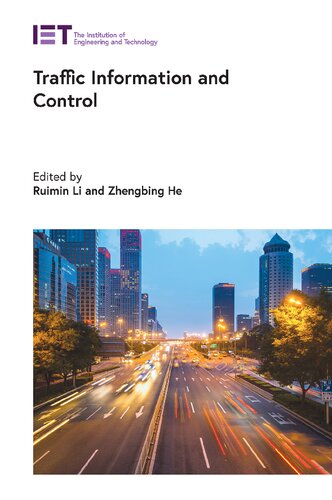

Most ebook files are in PDF format, so you can easily read them using various software such as Foxit Reader or directly on the Google Chrome browser.
Some ebook files are released by publishers in other formats such as .awz, .mobi, .epub, .fb2, etc. You may need to install specific software to read these formats on mobile/PC, such as Calibre.
Please read the tutorial at this link: https://ebookbell.com/faq
We offer FREE conversion to the popular formats you request; however, this may take some time. Therefore, right after payment, please email us, and we will try to provide the service as quickly as possible.
For some exceptional file formats or broken links (if any), please refrain from opening any disputes. Instead, email us first, and we will try to assist within a maximum of 6 hours.
EbookBell Team

0.0
0 reviewsWritten by an international team of researchers, this book focuses on traffic information processing and signal control using emerging types of traffic data. It conveys advanced methods to estimate and predict traffic flows at different levels, including macroscopic, mesoscopic and microscopic. The aim of these predictions is to optimize traffic signal control for intersections and to mitigate ever-growing traffic congestion.
The book begins with an introduction to the topic, its fundamental principles and recent developments. The first part of the book then covers the estimation and prediction of the traffic flow state based on emerging detailed data sources. Coverage in this section includes traffic analytics with online web data; macroscopic traffic performance indicators based on floating car data; short-term travel time prediction by deep learning a comparison of different LSTM-DNN models; short-term traffic prediction under disruptions using deep leaning; real time demand based traffic diversion; game theoretic lane change strategy for cooperative vehicles under perfect information; and cooperative driving and a lane change-free road transportation system.
The second part focuses on traffic signal control optimization, explaining how to use improved data and advanced tools for better signal control. Chapters include urban traffic control systems; algorithms and models for signal coordination; emerging technologies to enhance traffic signal coordination practices; control for short-distance intersections; and multi-day evaluation of adaptive traffic signal system based on license plate recognition detector data.
A valuable resource for researchers and engineers working in the field of traffic information and control, and intelligent transport systems, Traffic Information and Control offers an overview of recent research and practical approaches to optimising traffic signal control.